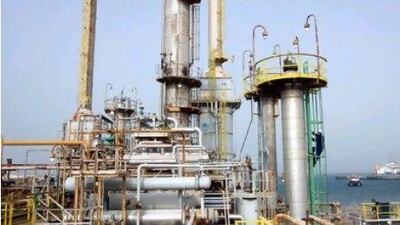Increasing tensions in the Mena region are driving up oil prices again, with expectations rising of a complete curtailment of Libyan exports and falling spare capacity in Saudi Arabia.
North Sea Brent crude topped US$116 a barrel yesterday, jumping 2 per cent soon after the start of trading in London.
In New York, oil futures advanced by as much as 2.3 per cent to exceed $103 a barrel for the US benchmark crude, as concerns grew that allied air strikes in Libya threatened to prolong deep production cuts in the North African nation.
Analysts predicted crude would reach between $120 and $200 a barrel, depending which of various possible scenarios play out in the volatile region.
"The list of troubles in the Mena region keeps growing by the day," a Merrill Lynch report said. "There are simply too many fronts open at this stage and a more severe oil disruption cannot be ruled out."
Libya's crude output has fallen below 400,000 barrels per day (bpd), or about a quarter of its pre-crisis level.
Shokri Ghanem, the chairman of the country's National Oil Corporation and its de facto oil minister, said output could stop entirely, as the Libyan president Muammar Qaddafi vowed to repel attacks against military installations.
Analysts predicted Libya's exports of light, sweet crude, which is especially prized by European refiners, could be offline for at least a year.
"With the nature of the external military involvement becoming clearer, there is a further escalation of the situation and the damage to infrastructure might be larger, keeping Libya out of the oil market for longer," Amrita Sen, an analyst at Barclays Capital, told Reuters.
Other analysts had more dire predictions.
Crude could jump to $150 or more if Libya's revolution spread to Algeria, requiring Saudi Arabia to bring all of its spare capacity online to compensate, Shawkat Hammoudeh, a professor of economics and international business at Drexel University in the US, said in the current issue of Middle East Economic Survey.
US oil fell last week below $100 a barrel, dragged down by fears that Japan could face a long nuclear crisis after a devastating earthquake and tsunami hit its north-east coast.
Yesterday, workers at the site of the crippled nuclear power plant seemed to be gaining the upper hand after restoring power to pumps that circulate cooling water.
The easing of Japanese concerns allowed oil prices to return to the upward path that earlier took Brent crude close to $120 and New York oil futures near $105.
Other big oil consumers were also alarmed by crude's renewed rise.
"I [was] very surprised and shocked when I saw the international price of [US] oil has exceeded $100 per barrel," the Chinese premier Wen Jiabao told a group of visiting business leaders yesterday.
Mr Wen blamed the increase on Middle East unrest and loose monetary policies in "some countries".
Internationally, concerns seemed squarely focused on Saudi Arabia. Already, analysts estimate that Saudi spare capacity of about 4 million bpd before the unfolding Arab political crisis has been eroded to between 2 million and 3 million bpd.

